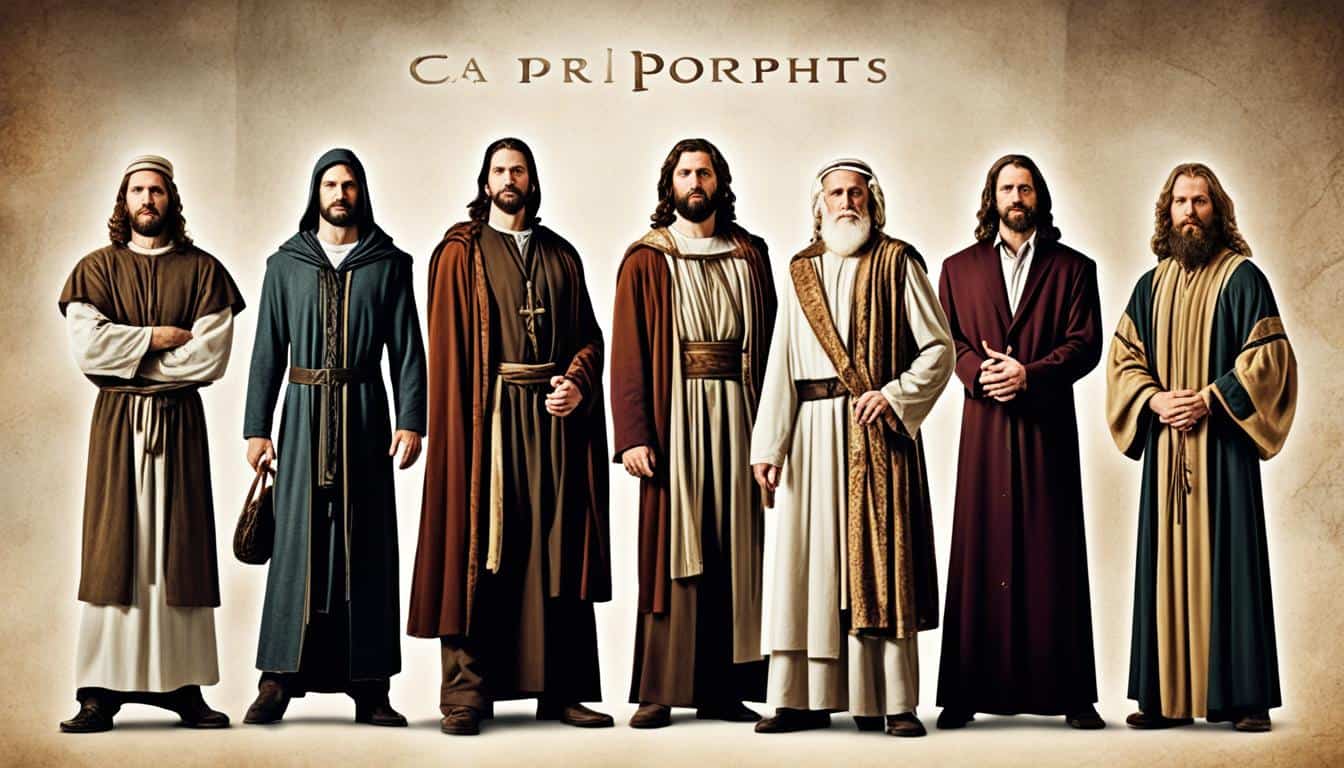Table of Contents
Have you thought about the different types of prophets in the Bible? Maybe you thought there was just one kind. But the truth is, prophets had many different roles. Join us on a journey to discover the diverse world of biblical prophets.
There were prophets who spoke truth at the moment, called forthtellers. Others, called intercessors, prayed for their people. Some could see the future, and others warned of bad outcomes for wrong actions. There were also advisers to powerful people and those heartbroken over wrongdoing and punishment.
So, are you excited to learn more about the prophets in the Bible? We will look into what they did, what they said, and how they affected their time. It’s a chance to think about your beliefs and see the amazing work of these ancient people.
The Forthteller: Prophets who Predict Future Events
In the world of biblical prophecy, forthteller prophets are unique. They have a special gift to communicate God’s plans clearly. This often includes knowing what will happen in the future. They are like messengers from God, helping guide His people.
Amos 3:7 underlines how important forthteller prophets are. It says God shares his plans first with them before doing anything. This shows their key role in sharing God’s intentions and wisdom.
“Surely the Lord God does nothing, unless He reveals His secret to His servants the prophets.”
Forthteller prophets can see what’s coming before it happens. This gives us a special insight into what the future holds. Their words can comfort, alert, and inspire us.
What they say is timeless and speaks to everyone. They bring comfort and understanding to life’s mysteries. These prophets are like lamps, showing us the way ahead.
By learning about these prophets’ words, we can understand God’s big plan better. Their messages show how our choices today shape tomorrow. They also show that God’s control goes beyond time itself.
Gain insights from the forthteller prophets:
- Explore prophecies that predicted significant historical events
- Discover how the forthteller prophets conveyed messages of hope and restoration
- Uncover the relevance of forthtelling in today’s world
- Reflect on the role of prophecy in shaping our understanding of God’s plan for humanity
Key characteristics of the forthteller prophets:
- Clarity of message
- Precision in predicting future events
- Credibility as divine messengers
- Relevance to the broader narrative of biblical prophecy
The Warning Prophet: Proclaiming Consequences of Disobedience
The warning prophets in the Bible warned people about sin. They told of the bad things that would happen if people did not obey God. Jeremiah is a famous warning prophet whose words are in the book of Jeremiah.
These prophets boldly spoke to leaders and the public. They faced danger to share messages against ways that disobeyed God.
Their messages talked about the bad results of going against God. They warned of hard times unless people changed. Their words were meant to help people see their wrongs and ask for forgiveness.
The warning prophets described the danger ahead with strong words. Their poetry and emotion showed how much they cared. They wanted to move hearts and bring about true regret for wrongdoings.
“But you, dress yourself for work; arise, and say to them everything that I command you. Do not be dismayed by them, lest I dismay you before them.” – Jeremiah 1:17
Jeremiah 1:17 shows Jeremiah’s call as a warning prophet. God told him to speak up, with no fear of how people might react. This verse shows how important it is for a warning prophet to speak God’s message, no matter what.
The Bible has many warning prophets who followed their mission faithfully. They not only warned against disobeying God but also gave hope to those who listened.
Examples of Warning Prophets in the Bible:
- Elijah
- Isaiah
- Ezekiel
- Amos
- Hosea
Warning prophets remind us that listening to God is critical. It’s crucial for both individual and group success to follow God’s ways. Disobedience can have pretty bad outcomes.

| Consequences of Disobedience | Warning Prophets’ Message |
|---|---|
| Divine judgment | A call to repentance and reconciliation |
| Destruction and exile | A plea for obedience and faithfulness |
| Suffering and hardship | A warning of the consequences of rebellion |
| Loss of blessings and favor | An invitation to turn back to God’s ways |
The Royal Counselor: Prophets Advising Kings and Leaders
In ancient times, prophets were trusted advisors to kings and leaders. They guided nations, mixing spiritual insight with worldly wisdom. By doing so, they ensured political decisions were in line with God’s will.
For example, Nathan advised King David. In a famous story from 2 Samuel 12:1-14, Nathan boldly confronted David over an affair. This shows how prophets helped keep leaders in check.
“[Nathan] went to [David] and said to him, ‘There were two men in a certain town, one rich and the other poor…
‘Now a traveler came to the rich man, but the rich man refrained from taking one of his own sheep or cattle to prepare a meal for the traveler who had come to him…’.”
By using storytelling, Nathan spoke to David’s conscience. This showed the powerful role of royal counselors in guiding leaders.
Even today, prophets advising leaders remain vital. They offer insights to help leaders make choices that are morally sound and based on divine principles.
| Advantages of Royal Counselor Prophets | Examples |
|---|---|
| 1. Spiritual guidance combined with worldly wisdom | 1. Nathan advising King David |
| 2. Access to divine insight and foresight | 2. Samuel counseling Saul |
| 3. Unbiased perspective outside of political agendas | 3. Ahijah advising Jeroboam |
| 4. Accountability and moral compass for leaders | 4. Elijah challenging King Ahab |
| 5. Mediation between leaders and God’s will | 5. Isaiah counseling Hezekiah |
Wisdom and Leadership
Royal counselor prophets offer more than advice; they bring wisdom and spiritual insights. This helps them guide political matters with God as their source.
They stand for God’s principles, pushing leaders to make right and fair choices. This ensures leaders care for their people and promote well-being.
In the end, the bond between prophets and leaders benefits both society as a whole.
The Writing Prophet: Documenting Messages for Future Generations
The writing prophets were key in saving and writing their messages for the future. They carefully wrote down what they believed were messages from a higher power. This made sure the messages stayed around for others to read and understand.
Isaiah is well-known among these prophets. He wrote about various topics, including a future savior, turning away from bad to good, and the hope of better times ahead.
Their actions offered wisdom for all time. Their messages teach us a lot about faithfulness, fairness, and how much God loves his followers.
“The words of the writing prophets echo through the ages, reminding us of God’s sovereignty and His desire for a relationship with His creation.”
Preserving Divine Messages
The writing prophets made sure God’s words were not forgotten by writing them down. They carefully included God’s commands, warnings, and kindness for the future.
- The writing prophets meticulously transcribed their messages, divinely inspired words that served as a testament to God’s presence in the midst of His people.
- These writings provided a reliable account of the past, a clear understanding of the present, and a glimpse into the future for individuals seeking a deeper connection with God.
- Their words offer comfort, guidance, and solace to those who seek spiritual insight and wisdom, showing the eternal relevance of their messages even in today’s world.
The writings offer more than just lessons about ancient times. They bring wisdom and strength to those who read them today.
Imparting Spiritual Truth
Writing down the messages helped the prophets deeply explain spiritual truths to later generations. Their words explained God, people’s struggles, and the future of humanity.
Reading their books is like finding a treasure chest full of important teachings and insights. They help us learn about God’s nature and his great work through time.
Through the writings of the prophets, we gain a deeper understanding of God’s faithfulness, justice, mercy, and love for His creation.
Their messages challenge us to think about our actions and turn to what is right. They remind us of the cost of not following God, but also of the great hope we have.

Writing Prophets and Their Books
| Prophet | Book |
|---|---|
| Isaiah | Isaiah |
| Jeremiah | Jeremiah, Lamentations |
| Ezekiel | Ezekiel |
| Daniel | Daniel |
| Hosea | Hosea |
| Joel | Joel |
| Amos | Amos |
The Sign Prophet: Emphasizing Messages through Symbolic Actions
The sign prophets used special ways to speak their messages in the Bible. They didn’t just talk, they showed their teachings through actions. This made their lessons more memorable for everyone.
Ezekiel is a famous sign prophet. He showed a vision of Jerusalem’s siege in Ezekiel 4. Using different items, he acted out the city’s coming destruction and judgment.
Symbols like these are strong signs that grabbed people’s attention. They shared deep spiritual truths and urged folks to pay close attention to their messages.
“Prophetic symbols are not merely meant to be interesting; every symbol had a purpose, a lesson, or an impact. The actions and visuals performed by sign prophets were intentional and aimed at conveying the urgency and gravity of their prophetic messages.” – Dr. Sarah Adams
Through these symbols, sign prophets connected deeply with their audience. They went beyond words, making their messages standout in people’s hearts and minds.
| Symbolic Action | Meaning |
|---|---|
| Building and demolishing a miniature city | Symbolized the impending destruction of Jerusalem |
| Lying on one side for extended periods | Represented the duration of Israel’s judgment |
| Eating a scroll | Illustrated the assimilation of God’s word into the prophet’s being |

These unique actions made the prophets’ lessons powerful and unforgettable. They made the words come alive, being etched into the minds of their listeners for years to come.
The Lamenting Prophet: Expressing Sorrow over Sin and Judgment
The lamenting prophets in the Bible deeply felt their people’s sins. They were sad about the coming judgment. Prophets like Jeremiah showed their grief with heartfelt words and prayers. They wanted their people to repent and find God’s mercy.
Jeremiah was one of these prophets. He felt sad and mourned for his nation. His words in Jeremiah 8:21-22 show his deep pain:
“Since my people are crushed, I am crushed; I mourn, and horror grips me. Is there no balm in Gilead? Is there no physician there? Why then is there no healing for the wound of my people?”
These prophets not only grieved. They also warned people about their sins. They called for a change of heart and a return to God. Their words aimed to make people feel sorry for their wrongs and seek forgiveness.

Examples of Lamenting Prophets
Many prophets shared the role of the lamenting prophet. They deeply felt sorry about people’s sins and the upcoming judgment. Jeremiah and Ezekiel are among them.
- Jeremiah: Known as the “weeping prophet,” his book is full of sorrowful words and mourning.
- Ezekiel: He too showed deep grief. He warned about the destruction of Jerusalem.
The Power of Lamentation
Their messages are still relevant. They remind us about the results of turning from God. And they call for a change of heart and a return to God. Their sorrowful appeals are powerful.
Their words are timeless. They are a constant reminder of God’s will for repentance and renewal.
The Priest-Prophet: Religious Leaders and Spokespeople for God
In the Bible, the priest-prophets had a special job. They were both religious leaders and God’s spokespersons. Chosen by God, they taught people about faith, staying good, and how to worship.
Samuel is a great example. He was not just a prophet revealing God’s messages. Samuel also acted as a priest, leading the people in worship and making sacrifices.
“And the Lord appeared again at Shiloh, for the Lord revealed Himself to Samuel at Shiloh by the word of the Lord” (1 Samuel 3:21)
Samuel was key in Israel’s history. He made Saul the first king and later anointed David. David went on to be one of Israel’s greatest kings.
Priest-prophets were a link between people and God. They taught the law and gave spiritual advice. They made sure worship was pure and the people followed God’s rules. They helped bring spiritual freshness to the nation.
They did the sacrificial rituals and gave advice to rulers. With messages from God, they shaped the nation’s religion and ethics.
Comparing the Roles of Prophets in the Bible
| Prophet Type | Main Role | Prominent Examples |
|---|---|---|
| The Forthteller | Predicting future events | Moses, Isaiah |
| The Warning Prophet | Proclaiming consequences of disobedience | Jeremiah, Jonah |
| The Royal Counselor | Advising kings and leaders | Nathan, Elijah |
| The Writing Prophet | Documenting messages for future generations | Jeremiah, Ezekiel |
| The Sign Prophet | Emphasizing messages through symbolic actions | Ezekiel, Hosea |
| The Lamenting Prophet | Expressing sorrow over sin and judgment | Jeremiah, Ezekiel |
| The Priest-Prophet | Religious leaders and spokespeople for God | Samuel, Ezekiel |
| The Prophetic Intercessor | Pleading for forgiveness and restoration | Moses, Samuel |
Priest-prophets were central to Israel’s spiritual life. They reminded people of God’s presence and helped them connect with God. They guided the nation in its worship and relationship with God.
With their dual role, they had the power to guide and correct the people. They aimed to bring people back to goodness and to keep their promises to God.

The Prophetic Intercessor: Pleading for Forgiveness and Restoration
The prophetic intercessors were key figures in the Bible. They stood before God, asking for forgiveness and restoration for the people. They knew prayer was crucial in seeking God’s mercy and redemption.
Moses is a prime example of a prophetic intercessor. He pleaded with God to forgive the Israelites for turning to idolatry. In Exodus 32:11-14, Moses begged God to stop being angry and to remember His promises and reputation.
Being a prophetic intercessor means more than just speaking or praying. It’s about being deeply connected with God, asking for His direct involvement in restoring people’s relationships with Him. They aimed to unite the people’s repentance with God’s mercy, restoring them to His favor and blessings.
Their prayers are a vivid example of God’s love and mercy. They show how deeply God desires to mend our broken connections with Him. Their unwavering commitment to praying for others should encourage us to trust in the power of prayer. We should also intercede for those around us, believing in God’s power to heal and restore.




